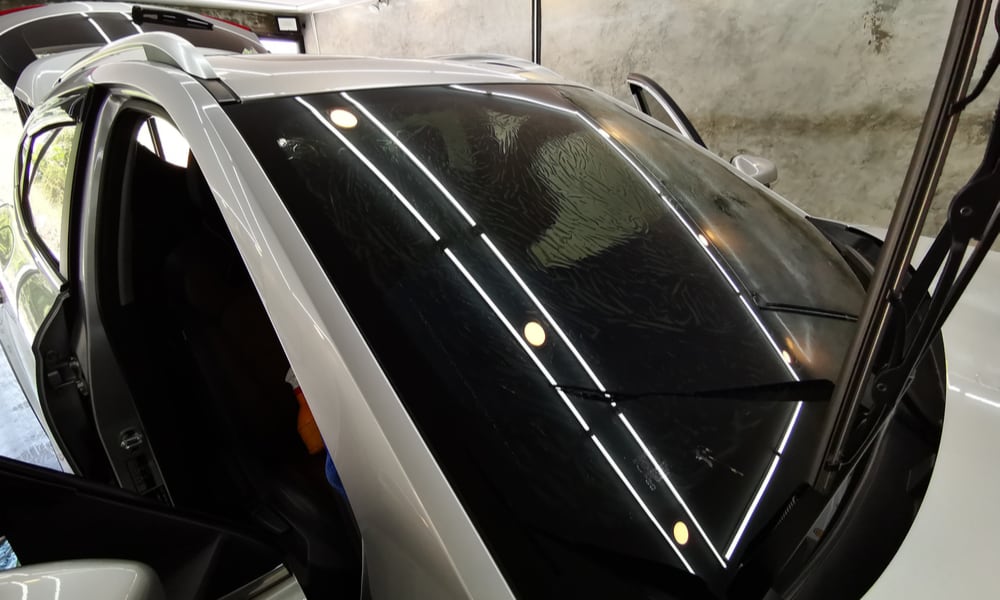WHAT IS A CERAMIC WINDOW TINT?
Ceramic window tint is a type of window film that is made of ceramic particles. Unlike other types of window tint, which use dyes or window tinting metallic particles to block the sun's rays, ceramic window tint uses advanced ceramic technology to reflect heat and ultraviolet (UV) rays.
This means that ceramic window tint is much more effective at reducing heat and UV radiation than other types of window tint.
Ceramic window tint is also highly durable and resistant to fading, cracking, and bubbling:
It can be applied to a variety of surfaces, including car windows, residential windows, and commercial buildings. It is also available in different shades and levels of darkness, allowing you to choose the right level of privacy and style for your needs.
Overall, ceramic window tint is an excellent choice for anyone looking to reduce heat, UV radiation, and glare, while also adding privacy and style to their windows.
How is Ceramic Tint for Windows Made?
Ceramic tint for windows is a type of window film that is made using advanced ceramic nanoparticles. The manufacturing process for ceramic tint involves several steps:
Mixing Ceramic tint is made by blending ceramic nanoparticles with a clear polyester film:
The exact recipe for the mix varies depending on the manufacturer, but the ceramic nanoparticles are typically mixed with a solution of ethylene glycol and water.
Coating Once the ceramic tint mixture is ready:
it is coated onto the clear polyester film using a special coating machine. The coating process is done in a clean room environment to ensure that no dust or other particles get into the film during production.
Drying After the coating process is complete, the ceramic tint is allowed to dry for several hours. During this time, the solvent in the mixture evaporates, leaving behind a thin layer of ceramic nanoparticles bonded to the polyester film.
Cutting Once the ceramic tint is fully dried:
it is cut to the desired size and shape using precision cutting machines. The film is cut slightly larger than the window it will be applied to, so that it can be trimmed down to fit perfectly during installation.
Packaging Finally, the ceramic tint is packaged and shipped to distributors and retailers for sale to consumers.
Ceramic tint is highly durable and effective at blocking UV rays:
heat, and glare. It is also relatively scratch-resistant and does not fade or discolor over time, making it a popular choice for car and home window tinting.
What are the Benefits of a Ceramic Window Film?
Ceramic window films offer a range of benefits for homeowners and car owners alike. Here are some of the key advantages of using ceramic window film:
UV protection:
Ceramic window films block up to 99% of harmful UV rays, which can cause skin damage and fading of furniture, upholstery, and flooring.
Heat rejection:
Ceramic window films are highly effective at rejecting solar heat, which can help to reduce the amount of heat that enters your home or car. This can help to lower your energy bills and improve your comfort level.
Glare reduction:
Ceramic window films can also reduce glare from the sun, making it easier to see while driving or working in your home.
Privacy:
Ceramic window films can provide a level of privacy, blocking the view into your home or car from the outside.
Safety and security:
Some ceramic window films are designed to provide an extra layer of protection, helping to hold broken glass together in the event of an accident or break-in.
Aesthetics: Ceramic window films best window tinting are available in a range of tints and shades, which can enhance the appearance of your home or car while providing the above benefits.
Overall, ceramic window film is a cost-effective way to improve the comfort, safety, and appearance of your home or car while protecting your family and belongings from harmful UV rays.

Comments
Post a Comment